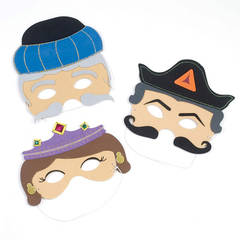Esther Concealed and Revealed: the Mask of Purim
03/06/2023 12:31:10 PM

Purim, the early spring dress-up holiday celebrating the defeat of an evil doer’s attempt to wipe us out, has surprising depths.
Aside from frivolity and joy, the great theme of the day is surprising. It’s hiddenness. In the Megillah, the Book of Esther which is read in the evening and on the day of Purim itself, everyone it seems is someone other than they appear. Most prominently, Esther, whose very name means “hidden” in Hebrew while it means Astarte in Persian, hides her Jewish identity. Her Hebrew name, Hadassah, is only mentioned once in the entire book.
In fact, it is through her hiddenness that she is able to save her people. The sudden reveal at the critical moment makes all the difference. Denouncing Haman, she asks the King for her life and the life of her nation.
But who is the real Queen? Esther or Hadassah?
At the moment of the big reveal, you’d think that Esther would do something dramatically Jewish to make her point - pull out the Magen David she wears hidden on a necklace, or declare her Hebrew name, reveal the main entree of the banquet as a nice piece of brisket or sing Hatikvah. Instead, the Megillah says that she dressed in her royal attire and uses the deferential Persian form of address.
It’s all Esther and no Hadassah, even at the moment of truth.
Why?
The Kabbalah teaches that all of life is concealment within concealment. The outer form encases an inner essence and that inner essence is itself a concealment of a deeper essential layer which is - another concealment!
Who and what we truly are, what the world truly is are all in their essence beyond our ability to grasp for the very self that we think we are is only at its heart another layer of concealment.
So do we abandon any quest for truth or honesty or understanding of reality?
Of course not.
Instead, we act out of awareness that our perception is “espied through a glass darkly”. We embrace the illusion, use the concealment to tell our truth.
In other words, we fake it until we make it.
When an actor assumes a role, they carefully craft a persona. It is through that persona that Romeo and Juliet evoke tears and tell the devastating truth about love. It is through a persona that Jean Val Jean in Les Miz tells a transforming truth about being true to who you are or how Rick is able to give up Ilsa and rejoin the struggle in Casablanca. It is through fictions that truth is made manifest.
But more, the role that we play, the mask that we wear can not only help us tell our truth, it can help us become better human beings. Claudius in Hamlet advises his son, “Assume a virtue if you have it not for…use can almost change the stamp of nature.”
So on Purim, we are asked not to simply acknowledge that all of us are in disguise, all the time, even from ourselves, but to embrace our masks, to use our masks to tell our truth and to develop our humanity. And finally, at the very essence of all essences to know that we are all ourselves the masks that the Divine assumes to create the world.
Oscar Wilde, the Irish poet and playwright was an earnest expositor of the truth who knew something about masks that conceal who we truly are. And yet he also knew the secret of masks and their power to tell the truth. He famously said,
Man is least himself when he talks in his own person. Give him a mask, and he will tell you the truth.
As we celebrate Purim, let us fully rejoice - because we know that beneath all of the masks, the Source of Being joins us in the celebration that is life. Happy Purim!
